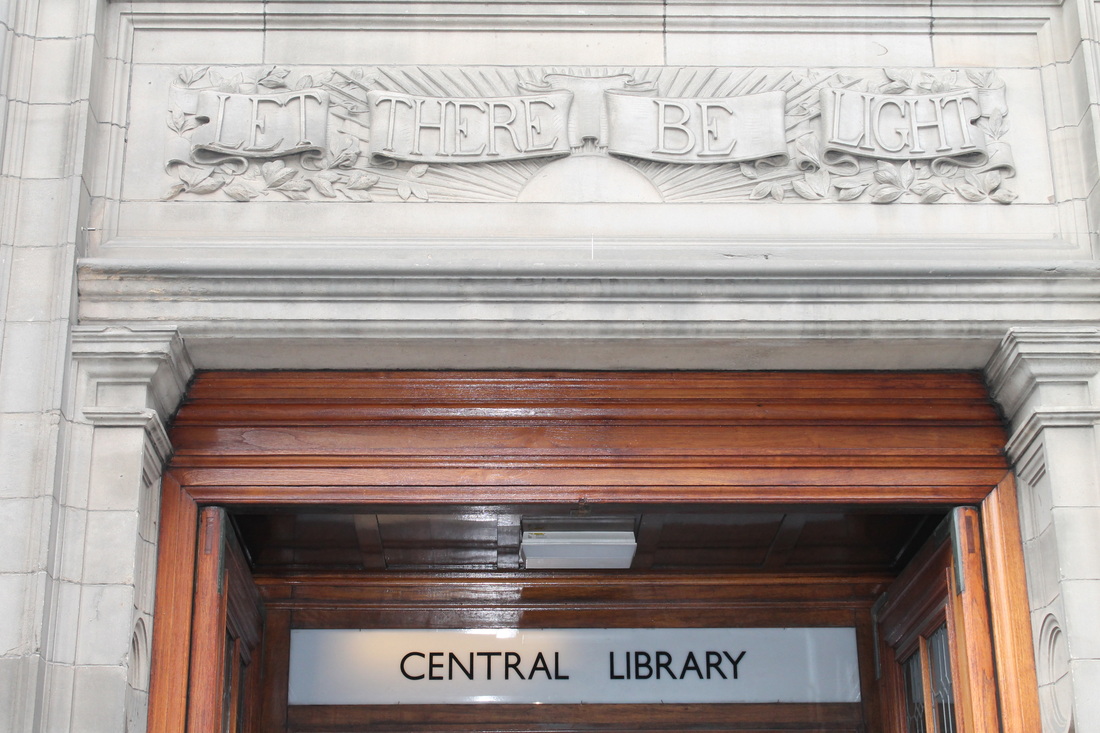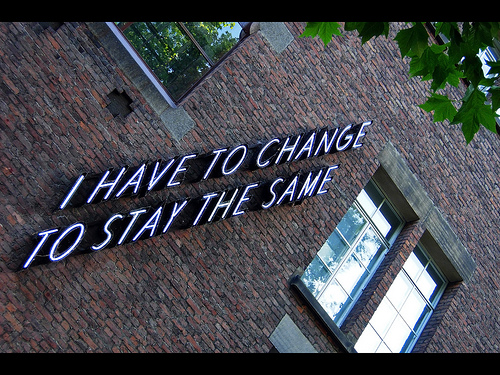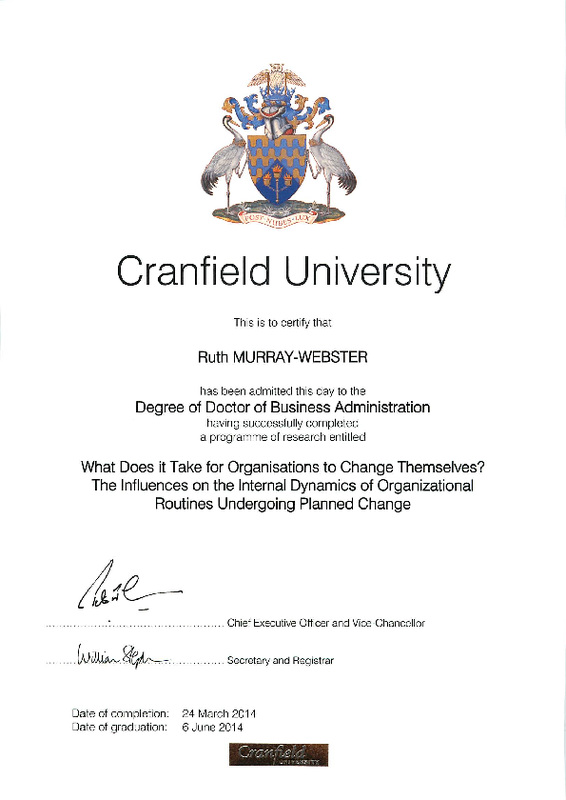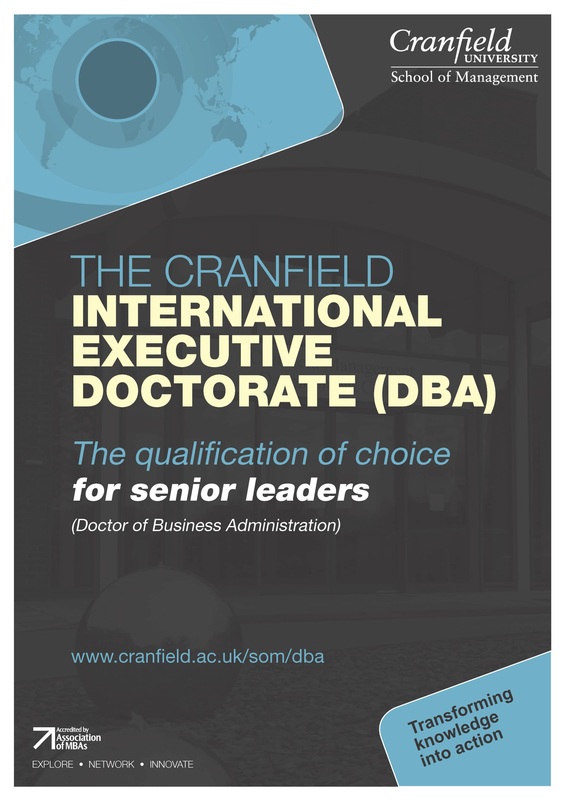|
It was strange today to do the payroll for my company, and to issue myself with a P45.
After 18 years of self-employment/being my own boss it will be strange to join a large organisation again next Monday and I'm sure there'll be things for me to adjust to as I transition from one set of working practices to another; but I feel blessed today that my temporary unemployment is a choice and that I have an exciting new role to get my teeth into next week. It's made me spare a thought though for those people who have recently received P45s with nowhere to move to. Hopefully my future work with senior teams to improve the maturity of their risk-taking practices will create more opportunities and jobs as wasteful spend created by poor decisions is decreased.
0 Comments
A few things have happened over the past days that have made me ponder about the power of language, and particularly the written word.
I've been enjoying the Edinburgh Festival and Fringe with my family for the first time. Listening to (in the case of the Fringe) or reading the words of talented writers sharing their take on the world is one of my guilty pleasures. Having had quite an overdose of this, I was intrigued to listen on the radio to people discussing George Orwell's 1984 and the attempts of 'newspeak' to eliminate personal/independent thought in that novel. Our ability to share a language that allows us to express our thoughts and feelings is surely a thing to be treasured. So, to honour that, the inscription above the Central Library in Edinburgh seems most fitting. Take a look at these.
Humbling and first rate advertising. Well done Scope. End the Awkward Strip for Scope It was very thought-provoking today to see Willem de Kooning's iconic art in Rotterdam and to ponder on his message.
… a Shell project manager sends you this.
Q (asked by us) What will you do to ensure that an environment for effective risk-taking is built and fostered within your team Answer - Recognize that risk-taking is a behaviour, not a process, job or department. Now the rest of the world… Just in case anyone might think that people are rational and girls named Cindy couldn’t hurt you.6/15/2014 You may know that one of my interests over the past years has been to understand more about the influences on perceptions of risk and our behaviours as a result of those perceptions. I’ve written lots about this topic with my friend and colleague David Hillson (there are lots of practical resources in www.rara-risk.com) and I’ve tried to help numerous people in client organisations to devise practical ways to understand the things that are skewing perceptions during decision-making in risky and important situations.
You can imagine then that my interest has been well and truly captured by the recent research in the US that suggests that people’s perception of the risks to their safety and livelihood when faced with the potential of being affected by a hurricane that makes land is influenced by whether the hurricane has been given a feminine or masculine ‘name’. The research, published in a serious peer-reviewed journal, used a range of data-collection techniques and was able to show no relationship between a hurricane’s severity and its name, but a strong correlation between the hurricane’s given name and the number of people who die as a result of it. It seems for the population of Americans that took part in the research that the more feminine a name is perceived, the less it is perceived that a hurricane given that name could hurt you, therefore judgments about how to respond were less cautious and less effective in protecting life. This makes perfect sense to me. I know that our perceptions are skewed by all sorts of things, and this example is just one more. If we are to make sound decisions in risky and important situations, we need to get a whole lot better at challenging our gut-reactions of what to do for the best. PS: I’m still processing my thoughts about the more worrying part of this research – that we might judge a person’s likelihood to be gentle rather than violent by their name. For another day… …and you've got 45 minutes to spare to listen (or watch and listen), then this is a link to a webcast where I talk about and am asked questions about the implications of my doctoral research for planned change practice.
It's a small ad for Cranfield School of Management, and me, but 90% of it is useful stuff for practitioners I hope. Enjoy Let me know what you think. http://wp.me/p2tQTT-qk I'll be blogging more about what it all means for practice over the coming weeks. A few golden nuggets that should help us get better at changing for the better.
This morning the business psychologist Grace Walsh posted a quotation from Anthony Hilton - Financial Journalist and Commentator that resonated with my experiences of the past couple of weeks.
‘It doesn’t matter how sophisticated your risk systems are, they’re all useless if people don’t behave as the computer model has forecast them to…..’ As Grace said, it again reiterates the problem with risk management strategies which focus primarily and solely on processes and excludes people issues. As we all know people more often don't behave as we think they should. Putting people into risk management is getting urgent! Really pleased that my latest academic paper, written with Sergio Pellegrinelli and Neil Turner has been accepted for publication.
We looked at a major transformation of a retail bank and how the complementary use of project management and programme management was used, deliberately, to ensure simultaneous exploitation and exploration activities during the planned change (organisational ambidexterity is the academic term). It's not too hard a read if you'd like to see the paper. It helps (we think) to see the complementary use of projects and programmes as separate but related disciplines, beyond a semantics debateLet me know on [email protected] The title of this post is a copy of one in a recent edition of the FT Weekend magazine (my favourite magazine - always a good read). A great column in the mag is "The Shrink and The Sage" that features questions like the one in this title with an opinion written from a psychotherapy and a philosophical viewpoint. Anyway - enough of the ad for the column and to the point of this post.
One of the unexpected consequences of me studying for my doctorate was the development of an allergic reaction to the word 'should'. Having had my philosophical mind levered open by the philosophy of management research classes, to hear people saying "She should do this…" "He should do that…" "People shouldn't do that…" drives me mad. Who says they should? Life is far more nuanced than a set of defined rules. Trying to get over this latest foible of mine, it was useful to read what the Shrink and the Sage said. We do well to not believe that we 'should' do things for irrational, unfounded, reasons. We do well to question and maybe challenge the people who exert their opinion about what's right and wrong for no apparent good reason, but also If we want to achieve certain objectives, live in certain situations, work with certain people, then there are conditions for doing so with respect and in harmony. So - I learned that my allergic reaction to the word should was silly - and that the word 'should' is OK if it's also associated with a condition, an 'if'. If I want to communicate clearly in this blog, I should think more before writing!! Led an online discussion this morning with some attendees at the 2nd Enterprise Risk Management online symposium - people from India, the Netherlands and Nigeria - all concerned with how we transform risk culture so leaders are able to take risk-aware decisions.
Everyone seemed in violent agreement that the change that is needed is behavioural, not about new knowledge and that there is too much evidence of 'paper management' as one person put it. I was surprised though that there seemed very little awareness of the people-related aspects of risk-informed decision-making within the group. I don't know whether to be depressed about that, or encouraged that there's still work for me to do for another few years!! The 2nd Enterprise Risk Management online symposium went live today.
You can watch and hear me talk about the organisational change challenge of transforming risk culture on this link http://www.risk2014.siscuss.com/lessons/transforming-risk-culture-the-organization-change-challenge/ (you will directed to a place to sign-in to the symposium) I've got a live Q&A session at 09.30am UK time on Thursday 8th May if anyone wants to join in so we can discuss how we can address, not run away from, this messy but vital subject. "In an increasingly ubiquitous world, create your point of difference with our Executive Doctorate - the highest degree you can attain. Join our upcoming #CranfieldDBA webinar with DBA Alumna Dr Ruth Murray-Webster, Prof David Denyer & Dr Emma Parry on 5th June 15:30-16:30 BST. Places are limited, REGISTER NOW: http://lnkd.in/dMr9xBT"
Back in 1998 I started working with a project management consultancy (PMProfessional) where I learned lots and made firm friends and colleagues - Peter Simon, David Hillson, Michel Thiry, Julia Johnson, Paul Naybour... to name just a few of from that era.
One of the things that used to really bemuse (and sometimes frustrate) me was the rush for a specialism. I was introduced to risk specialists, and value specialists, and I was hailed to be a quality specialist. I never quite got it because for me managing risk and quality and value is just part of management (and doing this in a project context is just part of project management). But - I bowed to the trend and joined in with the intention of becoming a specialist in a few of the boxes that had been defined. I was reminded of this today as I was sitting on the train catching up with magazine from professional bodies of which I'm a member. I'm a Chartered Quality Professional and Member of the Institute of Risk Management. In Quality World (April 2014) there is much anticipation of ISO9001: 2015 which is going to have a much greater focus on risk-based quality, i.e. balancing risk and reward. Of course, for me, preventive action in ISO9001: 2008 is all about risk analysis and management (what risks to quality exists and how will we managed them), but a yet greater integration of risk with quality is good. In RMProfessional (Spring 2014), there is a great article that continues a theme I've pursued for some time about integrating risk thinking with normal managerial decision-making, but this article goes further to suggest better integration of risk with management systems, such as ISO9001: 2015. Hurray! I've decided that I'll never beat the separation of these disciplines - the market to 'professionalise' them is too great - and there is much good done by these professional bodies. But I'll keep on pushing that for me, it's about management and sensible integration of a few basis ideas about achieving objectives and keeping variation in achieving them inside tolerable limits. This post was triggered by reading a job advert for a change manager in a large multi-national company. It explained the role, largely by saying that there was widespread resistance to change in the organisation that the job holder would be responsible for understanding and managing.
I have just finished my doctoral studies into planned change. Putting it politely - it's a bit old-fashioned in 21st century Britain to think about people's perceptions and choices during change as 'resistance' - with its connotations that this is illogical and illegitimate in some way. My doctoral work has looked, from an academic point of view, at what I have long believed as a practitioner - that change agents (project managers, programme managers, change managers or whatever you want to call them) are more successful more of the time if they think about their work from the perspective of the people whose work will change as a result of what they're doing. Change strategies and plans that are based on a real understanding of attitudes to change will always be more successful than those based on 'text-book' approaches that relegate people to the 'users' category. That 'users' might resist change is possible. That people who know their job will automatically do so is to miss the point. Now this could be my quote - but it's not. This blog is inspired by an article in the Financial Times Weekend (my favourite newspaper) from 30 November/1December 2013 - it's been languishing in my in-tray waiting to get its moment.
I saved the article because it's an interview by David Pilling of Ha-Joon Chang - the Korean born, Cambridge economist and author of (among lots of other things), the brilliant book "23 things they don't tell you about capitalism" (2010). I'd really recommend you put this on your Christmas list. Here are some quotes I loved from the interview. "The predominant view in the profession is that there's one particular way of doing economics. It's basically to set up some mathematical model, the more complicated the better…" "…then to pretend that we are all selfish and that we basically do our best to promote self-interest, making choices in a rational way" "I don't take that view. Rational thinking is an important part of human nature, but so is imagination, we have ambition, we have irrational fear, we are swayed by other people, we get indoctrinated and we get influenced by advertising" "Economics used to be a branch of moral philosophy - about politics and culture and society and morality. Unfortunately now, too many economists want to make their subject a science like physics or chemistry - I am called a sociologist as a put-down - it's like the Catholic Church of old when they refused to translate the bible so only Latin scholars could read it. Today, unless you're good at maths and statistics you cannot penetrate the economic literature, and that's wrong" Always a Radio 4 fan, but this one is worth putting in writing in my view.
I'm become increasingly interested in art and design since No.1 son decided to study art at university. He is fascinated with making things. His girlfriend, also an art student, creates art at the juxtaposition (a good arty word!) of design and nature. So this programme grabbed my attention with its focus on the work at University College London of MakeSpace and the Institute of Making. It's a great listen - really worth 30 minutes with a cuppa. Those of you who know me and know about my career will know that my practice is at the leading edge of both change management and risk management. I've been a bit surprised over recent weeks to find that some people find that odd and think when I'm doing things like writing my CV, or deciding how to pitch to clients, that I need to choose.
Of course, that would be the choice if business really did have a need for thinking about risk to be isolated only to thoughts of governance and internal control, or if thinking about change could be done sensibly without an understanding of the ambiguity that transformational change causes. To me it's obvious that risk and change, and change and risk, go hand in hand. So maybe it's worth thinking again: To make risk management really add value for your organisation, there's probably a significant culture change needed. To make your change plans work, there's probably a need to really understand the risks that the people involved perceive. Whichever way you look at it, I see no business case for choosing one or the other. Great to meet someone today (a partner in one of the big4 consultancies) who agreed with me. Interesting times. It was a real pleasure on Wednesday of this week to attend the annual lunch for Honorary Fellows of APM in the Emin Room at 34 (Grosvenor Square). Thank you APM.
Inevitably, most Honorary Fellows of APM are men, some of them now at grand old ages and this reflects the history of the profession. Some of us are women and that's great. But PLEASE APM, don't go on a positive discrimination campaign to get more women represented. I was honoured to be nominated and recognised as an HonFAPM. Don't make token women out of those of us who have worked really hard to achieve what we have. In thoughtful mood this morning, coming to the end of a hectic week.
Yesterday, Penny Pullan and I did a couple of webinars for people interested in improving their ability to engage others to identify, own and manage risk. You can get a copy of the recording of the webinar via www.facilitatingrisk.com if you want one. Inevitably the questions that arise in such discussions are about how to engage people (who are predictably diverse and irrational and thank goodness for that) with processes and systems in organisations that have been conceived from a rational paradigm. I could go on, but will only to say that engaging people to identify, own and manage risk requires people to meet others (in concept, and in what is thought, felt, said and done) where they are - not where you might want them to be. Tolerance and respect for other points of view are necessary inputs to creating some semblance of order in the face of risk. Always one to find a coincidence, I was tidying my in-box over my first cup of tea, and found an academic paper written by a philosophy professor in Canada (Joseph Boyle) entitled Universal Justice in a Diverse World (published in The Good Society, volume 19, no. 2, 2010). I decided to read it and there was the parallel. In short, he was arguing that "moral law requires tolerance and respect for those one disagrees with" because "there is a moral need to mitigate the social costs of refusing to be tolerant". Seems to me that at the heart of making progress in situations that are risky and important, there's a need to engage others about what they want, be tolerant enough to listen, be respectful enough to acknowledge their point of view and then to be courageous and skilful enough to build from where they are to get an outcome that meets as many needs as possible. It's not orderly in a rational and process-like way - but it's a way of creating order from what would otherwise be an unmitigated mess. As those who know me will appreciate, I am fascinated by the many and varied influences on our perception of what is risky and why in life and how this shapes our attitude and behaviour.
Recent storms and flooding in the UK has provided much media coverage and you'll be realising now that I'm a BBC Radio 4 listener. So here's another thing that struck me as significant when I listened on Thursday, but has kept coming up in my mind. There was this Dutch guy speaking about flooding of homes in the Netherlands and how, since the great North Sea floods in 1953 it has been impossible to get insurance for water ingress into buildings. This is just an everyday fact for Dutch people, so of course their attitude is not the one I heard a British guy say yesterday morning… "It's OK - if the water comes in we'll just claim on our insurance" The more striking thing though was the Dutch guy was not bemoaning the fact that they can't insure for water damage - he was remarking how, given this fact, the behaviours of all in society have shifted to make the prevention of flooding a priority. With all downside risks (things that might happen that would be bad) we can respond to the cause, or we can take the chance and then hope to recover (at least something) of what we've lost. Take away the chance to insure, and we seem to naturally adapt to thinking much more creatively about preventing loss in the first place. Yesterday on Radio 4 one of the interviewers (sorry, can't remember which of the men) said something that summed up perfectly the dilemma at the heart of risk management.
The discussion was about the recent flooding in parts of the UK and was discussing actions that could be taken to contain flood waters if they got as bad again. The comment went something like "…but you could spend all that money on the actions, but if there's no repeat of flooding in the short term then it will have been a complete waste of money" !!!!!!!!!!!!!!! (exclamation marks my own) Well - yes - that's the point. Managing risk means committing resources (people, time, money) NOW in case the situation that is risky (i.e. it only MAY happen) happens again. Just like buying insurance - if you don't claim, have you wasted your money? Or did you buy peace of mind that you were covered if you needed it. It seems so obvious - but it's so counter-intuitive when resources are short to invest in something you may never need rather than something you know you want now. The answer is of course doing brilliant risk analysis - so you know the things that it would make absolute sense to invest in now - so you never have 'buyer's remorse' I've been a regular blood donor since I worked at ICI and I volunteered to donate because you got a lie down and biscuit!
35 years on and I was thinking today during the donation process that the Blood Service has done some amazing 'leaning' of its processes. No more laying on a bed talking to a nurse, then laying some more on another bed (having a snooze) etc. The process is quick, painless and effective - and it saves lives. I probably wouldn't have done this blog post though had I not met a lady having my cup of tea and biscuit today who had just donated for the 75th time. That's lots of lives saved. If you are well, please do have a go if you don't already. (And that means you Josh and Liz!) |







 RSS Feed
RSS Feed
